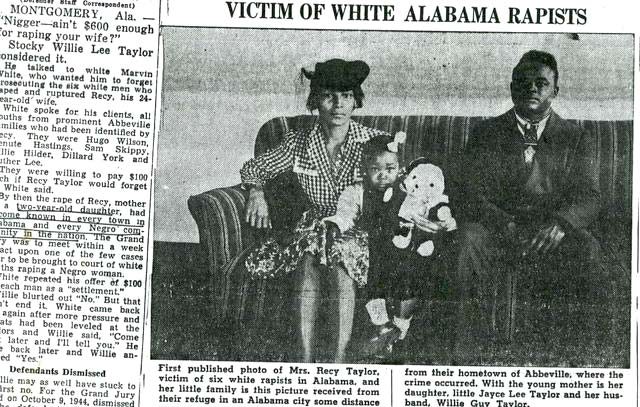My latest is out on Colorlines. Here's an excerpt:
At 91, Recy Taylor May Finally See Alabama Acknowledge Her 1944 Rape
Recy Taylor was abducted and raped at gunpoint by seven white men in Abbeville, Ala., on Sept. 3, 1944. Her attack, one of uncounted numbers on black women throughout the Jim Crow era in the South, sparked a national movement for justice and an international outcry, but justice never came. Now, decades later, there may finally be some solace for Taylor, 91, as Alabama state Rep. Dexter Grimsley tries to make his state issue a formal apology.
Reached by phone on Monday, Grimsley confirmed he is drafting a resolution for a state apology to Taylor. “The circumstances merit it,” he said. “It’s something that should be done. Recy Taylor found herself in a situation that wasn’t responded to, the way that the law would respond to something today.”
The FBI is currently investigating dozens of civil rights-era murders, mostly of men. But the sexual violence visited upon women like Taylor has never commanded the official attention of the FBI and other federal and state officials who have tried to right the crimes of our past.
“From slavery through the better part of the 20th century, white men in the segregated South abducted and assaulted black women with alarming regularity and often impunity,” explained historian Danielle McGuire, whose new book “At the Dark End of the Street: Black Women, Rape, and Resistance” was the first history of white-on-black sexual violence and black women’s organized resistance to it. “They lured black women and girls away from home with promises of work and steady wages; attacked them on the job; abducted them at gunpoint while traveling to or from home, work, church or school; and sexually harassed them at bus stops, grocery stores and in other public spaces.”
New awareness of Taylor’s case, and of the pervasiveness of many more cases like it, has begun attracting new bands of supporters who want justice for past crimes of sexual violence against black women—from members of an online social network for social change, to the NAACP Alabama State Conference, to a black lawyers’ association in Michigan, to individual letter writers and callers from all over the country who have contacted Taylor’s family.








